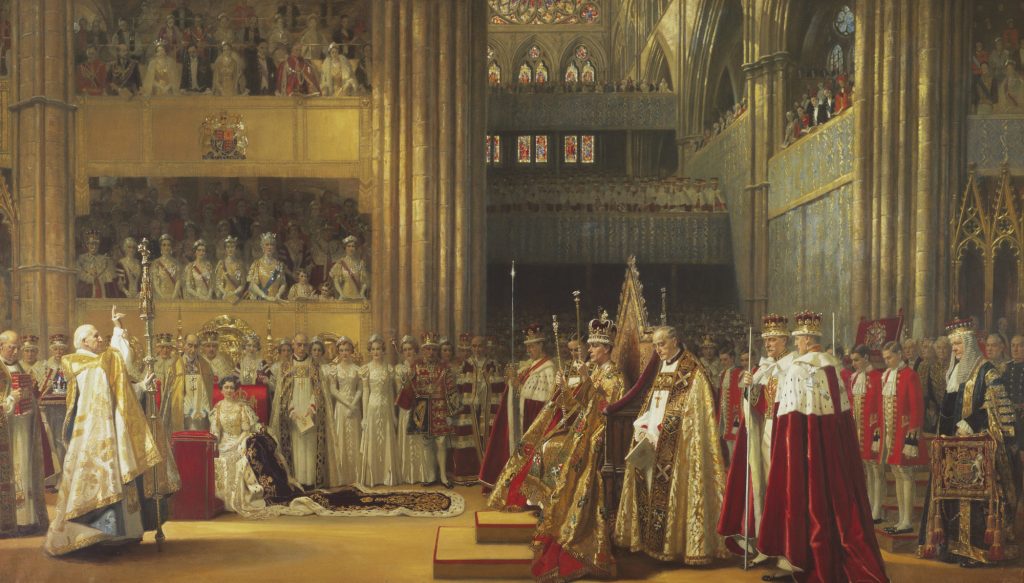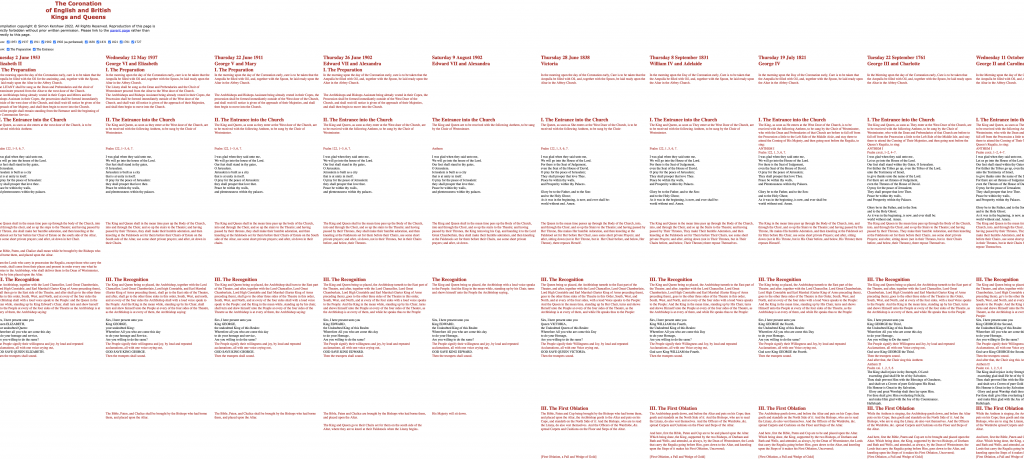Common Worship Almanac for 2022-23
My Almanac for the liturgical year 2022–23, the year beginning Advent Sunday 2022 is now available. The Almanac is a complete and customizable download that can be added to the calendar on a desktop/laptop, a tablet or a smartphone providing a fully-worked out calendar and lectionary according to the rules of the Church of England. Several download formats are provided, giving access to most calendar software on most devices.
As before, download is free, and donations are invited.
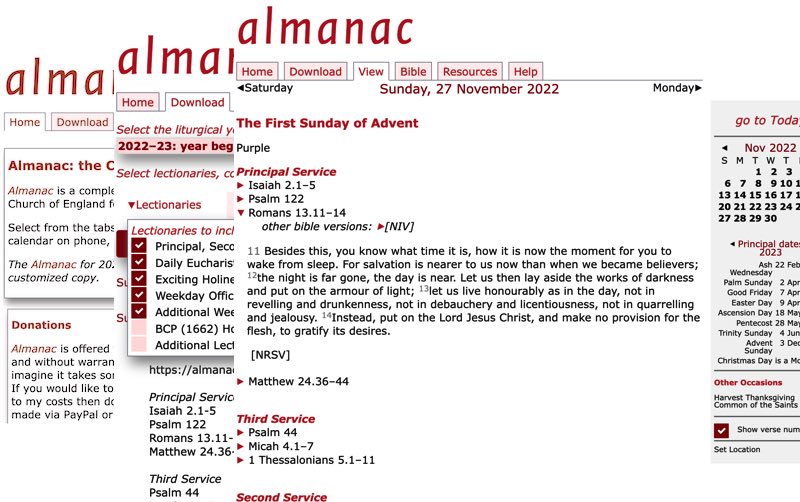
What's new?
The Almanac is also available as a web page that can be installed as a web app on smartphones and tablets for easy access to all the data. New features include
- In the View tab you can toggle the display of verse numbers in the readings, making it simpler to copy and paste passages to other documents in the desired format.
- Following the new Royal Warrant, updated BCP and CW prayers for the King and Royal Family are linked in the Resources tab; Accession Day is now on 8 September, rather than 6 February.
- Although not strictly a CW or BCP observation, an entry is included this year for Coronation Day on 6 May 2023; it is expected that resources for public observance of the coronation will be produced, and this material will be added when it is available.
- Astronomical data (sunrise, sunset, moon rise and set and phase, solstices and equinoxes) is now fully working again, as is the separate Crosscal calendar download at crosscal.oremus.org.
Donations
This Almanac is offered free of charge, and without warranty, but as you might imagine it takes some effort to compile. If you would like to make a contribution to my costs then donations may be made via PayPal at paypal.me/simonkershaw. Alternatively, Amazon gift vouchers can be purchased online at Amazon (amazon.co.uk) for delivery by email to simon@kershaw.org.uk .
The Almanac has been freely available for over 20 years. There is not and has never been any charge for downloading and using the Almanac — this is just an opportunity to make a donation, if you so wish. Many thanks to those of you who have donated in the past or will do so this year, particularly those who regularly make a donation: your generosity is appreciated and makes the Almanac possible.
0 CommentsThe Coronation of English and British Kings and Queens
(Coronation of King George VI, 1937, painted by Frank Salisbury; Royal Collection Trust)
Beginning with the coronation of James I in 1603 there have been sixteen English-language coronations of English, or from 1714 British, monarchs. Before that, upto and including the coronation of Elizabeth I, the service had been conducted in Latin. The seventeenth, for King Charles III, is scheduled to take place on Saturday 6 May 2023.
As a small boy, over half a century ago, I was captivated by a souvenir of the 1937 coronation of King George VI and Queen Elizabeth which belonged to my grandparents, and which contained the text of the service along with copious illustrations and some historical notes. From 1994 I have collected copies of the order of service of every coronation back to that of George IV in 1821, along with reproductions and editions of the earlier services back to 1603, as well as the music editions that have been published since 1902.
For some time I have thought of producing an historical edition of the coronation service with the different texts in parallel columns, making it easy to see the changes that have been made over the centuries. This is a bit complex to produce as a book (and perhaps not commercially viable) but a web page is easier to create, and can have other helpful features such as hiding or showing different sections of the page. So now there is a new page at oremus.org/coronation that contains the text of all the coronation services from 1953 back (currently) to that of George II in 1727. Work on adding earlier texts continues.
In each column the texts are aligned so that corresponding rubrics and spoken words match across the page. Individual columns can be hidden, making it easy to compare different years. Hiding rows, or sections of the text across all columns, is a feature that will be added soon.
The coronation of King Edward VII and Queen Alexandra scheduled for June 1902 was postponed because of the king’s illness. When it did take place in August, a number of modifications were made to place less stress on the convalescent king. Both the June and August texts are included in parallel columns.
With the Coronation of King Charles and Queen Camilla scheduled for next year, I hope this will be a useful historical archive.
0 CommentsLiturgy at the Funeral of Queen Elizabeth II
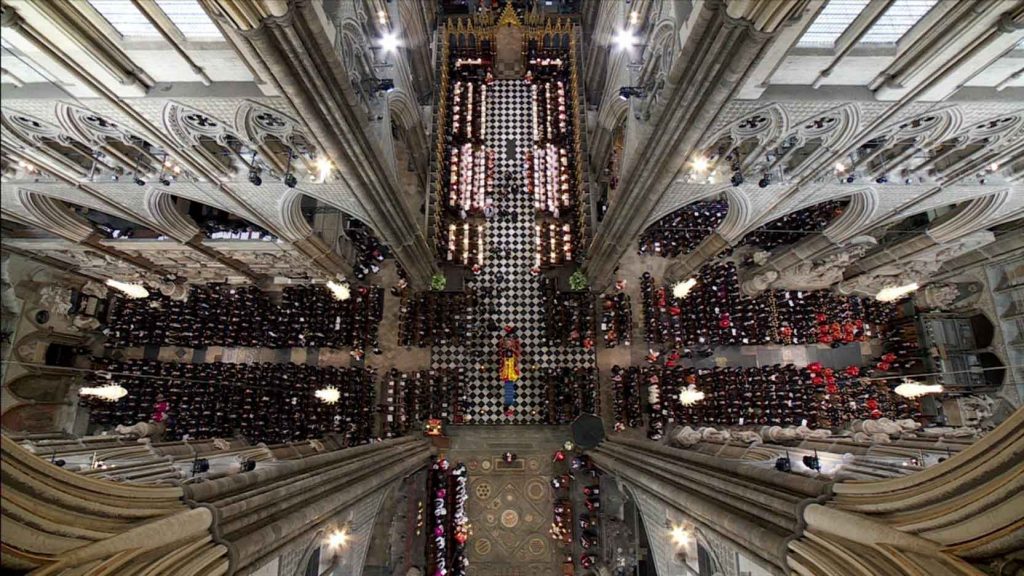 The death of the head of state of a country is a significant event, even more so when that person has been head of state for 70 years, and is head of state of more than one country. The death of Queen Elizabeth II, guaranteed to come at some point, was nonetheless an event that touched many people, and millions if not billions of people around the world mourned her in some way.
The death of the head of state of a country is a significant event, even more so when that person has been head of state for 70 years, and is head of state of more than one country. The death of Queen Elizabeth II, guaranteed to come at some point, was nonetheless an event that touched many people, and millions if not billions of people around the world mourned her in some way.
For the first time, Orders of Service for the funeral at Westminster Abbey, and the Committal at St George’s Chapel, Windsor, were published online, enabling those watching on television to follow the text and join in if they desired.
For future reference, copies of these Orders of Service are attached to this post:
0 CommentsStations of the Cross
Stations of the Cross is a traditional devotion for Lent, and especially for Holy Week. It originated in Jersualem, where pilgrims would literally walk along the route from the centre of the city to the traditional place of Christ’s execution, stopping en route to recall various incidents recorded in the gospels, or elsewhere in the tradition. The number and names of the stations were later codified at fourteen (to which a fifteenth station of the Resurrection was added in more recent times). Many sets of words and prayers have been written to acccompany the walk. I compiled this particular set for an ecumenical service in my home parish, and subsequently published them on the Thinking Anglicans blog. It envisages a scenario in which some of those who participated in or witnessed the original events are gathered to remember what happened on that day.
- Pilate condemns Jesus to death
- Jesus takes up his cross
- Jesus falls the first time
- Jesus meets his mother
- Simon helps Jesus carry the cross
- Veronica wipes the face of Jesus
- Jesus falls the second time
- Jesus speaks to the women of Jerusalem
- Jesus falls the third time
- Jesus is stripped of his garments
- Jesus is nailed to the cross
- Jesus dies on the cross
- Jesus is taken down from the cross
- Jesus is placed in the tomb
- Jesus is risen
Common Worship Almanac for 2021-22
My Almanac for the liturgical year 2021–22, the year beginning Advent Sunday 2021 is now available. The Almanac is a complete and customizable download that can be added to the calendar on a desktop/laptop, a tablet or a smartphone providing a fully-worked out calendar and lectionary according to the rules of the Church of England. Several download formats are provided, giving access to most calendar software on most devices.
As before, download is free, and donations are invited.
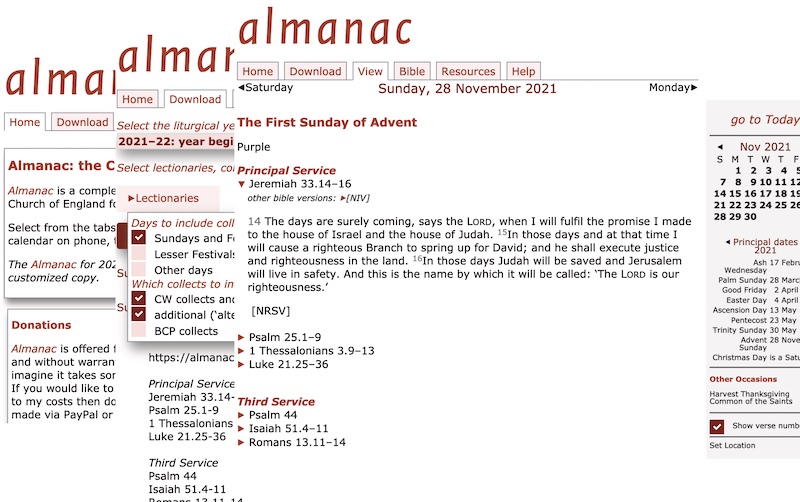
What's new?
The Almanac is also available as a web page that can be installed as a web app on smartphones and tablets for easy access to all the data. New features include
- the Download tab now shows a live preview of the data that will be added to your calendar; as you select options from the menus the live preview automatically reflects your choices
- in the View tab you can toggle the display of verse numbers in the readings, making it simpler to copy and paste passages to other documents in the desired format
- in the View tab the bible readings now have an additional link to the NIV text at Bible Gateway, as well as displaying the NRSV text (or the Common Worship psalter for psalms)
- a new shorter format for subscription links (old-style links continue to work as well)
Donations
This Almanac is offered free of charge, and without warranty, but as you might imagine it takes some effort to compile. If you would like to make a contribution to my costs then donations may be made via PayPal at paypal.me/simonkershaw. Alternatively, Amazon gift vouchers can be purchased online at Amazon (amazon.co.uk) for delivery by email to simon@kershaw.org.uk .
The Almanac has been freely available for over 20 years. There is not and has never been any charge for downloading and using the Almanac — this is just an opportunity to make a donation, if you so wish. Many thanks to those of you who have donated in the past or will do so this year, particularly those who regularly make a donation: your generosity is appreciated and makes the Almanac possible.
0 Comments2020-21 Almanac for Common Worship and BCP
Now available for the year beginning Advent Sunday 2020: Almanac, the calendar, lectionary and collects according to the calendar of the Church of England, for Common Worship and for the Book of Common Prayer. Download to your calendar or use the web app.
Download is free, donations are invited.
What's new?
The Almanac web page has been comprehensively updated since last year to make it easier and more useful. Updates include
- the download page and the daily view have been integrated into a single tabbed page
- the oremus Bible Browser (which includes the full NRSV, the AV, and the psalters from the prayer book and Common Worship) is added on another tab
- a resources tab provides direct links to all the official Common Worship texts, hymn suggestions (with links through to HymnQuest) and some other liturgical resources
- the Almanac daily view includes sunrise and sunset times, which can be customized to your location
- on phones and tablets you can add an Almanac icon or tile to your screen so that it is accessible like an app (details in the Help tab), and you can swipe forwards and backwards through the days, and through bible passages in the Bible tab
As usual, the Almanac is available in a number of formats for adding to Microsoft Outlook, Apple Calendar, iPhone or iPad, Google Calendar and other calendar applications. It can be synced from a desktop calendar to a tablet or smartphone (including Apple iPads and iPhones, Android phones and tablets, and Windows Surface tablets). There is also a csv format, which can be opened in a spreadsheet for further manipulation.
Naturally I hope that the Almanac is free of errors, but I disclaim responsibility for the effects of any errors. My liability is limited to providing a corrected file for import, at my own convenience. Please help by notifying me of possible errors.
Donations
This Almanac is offered free of charge, and without warranty, but as you might imagine it takes some effort to compile. If you would like to make a contribution to my costs then donations may be made via PayPal at paypal.me/simonkershaw. Alternatively, Amazon gift vouchers can be purchased online at Amazon (amazon.co.uk) for delivery by email to simon@kershaw.org.uk .
The Almanac web page carries the date 8 September 2000, so, as the Beatles sang, “it was twenty years ago” that I first provided a digital liturgical calendar, which in a couple of years evolved into a fully worked-out lectionary. There is not and has never been any charge for downloading and using the Almanac — this is just an opportunity to make a donation, if you so wish. Many thanks to those of you who have donated in the past or will do so this year, particularly those who regularly make a donation: your generosity is appreciated and makes the Almanac possible.
1 Comment
Centenary of the WW1 Armistice
Over the last few years the Church of England has published various liturgical resources for commemorating the centenary of significant moments in the First World War.
It has now added to that collection a set of resources for the centenary of the Armistice on 11 November, and entitled ‘Steps towards Reconciliation’: a monologue interspersed with words and music.
How are we to mark the end of a War in which so many lives were lost and damaged? We will certainly remember, but we must also commit ourselves afresh to working together for peace. Reconciliation requires an honest ‘truth telling’, and the text that follows seeks to respect the fact that we may only be able to take steps towards that goal.
This is an imaginative and thoughtful resource that can be used in a number of settings on and around 11 November 2018. It has been compiled by members of the Liturgical Commission.
The text is available as a pdf file here.
1 CommentTowards a Safer Church: Liturgical Resources
On Friday, the Liturgical Commission of the Church of England published “safeguarding resources, for use in churches across the country, including Bible readings, prayers and suggested hymns, chosen in consultation with survivors” under the title Towards a Safer Church: Liturgical Resources.
There is a press release here, and the liturgical resources are available in PDF format here
The Chair of the Liturgical Commission, Robert Atwell, Bishop of Exeter, in an introduction to the resources has written:
The Church needs to be at the vanguard of fostering a change of culture across society. Safeguarding is at the forefront of public consciousness and the Church needs to embody best practice in safeguarding in our network of parishes, schools and chaplaincies as part of our commitment to excellence in pastoral care.
Many of these resources are already being used widely across our churches, but we thought it would be helpful to gather them into one place for ease of access. Collectively they are neither the first word nor the last word on this subject, but they are offered in the hope that by God’s grace the Church may become a safer place where everyone is valued.
Libby Lane, Bishop of Stockport, has also written about the resources here
The resources have been compiled by the Liturgical Commission and staff, in consultation with survivors, who have themselves suggested some of the resources, with the aim providing prayers and other resources for various occasions. This includes use with survivors and others directly affected, as well as events such as the commissioning of safeguarding officers in parishes and dioceses. Most of the material had been previously published (including commended and authorized liturgical texts), but it has been brought together in one place so that it is easier to find and to use.
(This item has also been posted on the main Thinking Anglicans page.)
0 CommentsFurther resources for the Queen's 90th birthday
Church House has published online a set of Liturgical Resources for the Celebration of HM The Queen’s Ninetieth Birthday containing: Notes of Guidance; an outline service; collects and graces; and suggested readings.
The resources are available as a PDF here.
The notes say:
It is hoped that many churches and communities will be able to celebrate the ninetieth birthday of Her Majesty the Queen. This leaflet contains, by kind permission of the Dean and Chapter, the Outline of the Service of Celebration and Thanksgiving which will be held at St Paul’s Cathedral on Friday 10 June 2016. Churches are invited to use elements of this outline in their own preparations, especially the bidding prayer, intercessions, and act of thanksgiving in the appendices. In addition to the resources below, St Paul’s has commissioned the Master of the Queen’s Music, Judith Weir, to compose a choral anthem, I love all beauteous things, which can be used in the context of a celebration service and is now available.
1 CommentAlso included here are the Collects which The Queen has been pleased to approve for use in services celebrating her birthday, and Graces for use at church and community gatherings. Finally, the Liturgical Commission suggests a number of appropriate readings suited to a celebratory service.
Thanksgiving for the Queen's ninetieth birthday
The Liturgical Commission has prepared two collects (one in traditional language and the other in modern language) for use at services celebrating the ninetieth birthday of HM the Queen, which falls on 21 April this year. These have been approved by the Queen, and the Commission has asked that they be circulated as widely as possible. The Commission has also provided two graces for use at church and community gatherings such as street parties.
Collects:
Heavenly Father, who hast brought our gracious sovereign Queen Elizabeth to the completion of her ninetieth year, and dost gather her people in celebration of the same: grant that we, rejoicing before thee with thankful hearts, may ever be united in love and service to one another, and her kingdom flourish in prosperity and peace, through Jesus Christ our Lord.
Heavenly Father,
as we celebrate the ninetieth birthday of Her Majesty the Queen,
receive our heartfelt thanks
for all that you have given her in these ninety years
and for all that she has given to her people.
Continue, we pray, your loving purposes in her,
and as you gather us together in celebration,
unite us also in love and service to one another;
through Jesus Christ our Lord.
Graces:
Bountiful God, giver of all good gifts,
we give thanks for the many years and long reign of our Queen;
Bless our food, our neighbourhood,
and our enjoyment of each other’s company.
Help us to learn from Queen Elizabeth’s commitment to her people,
so that our community may be strengthened
and all may flourish.
We ask this in the name of Jesus, the King of love.
Gracious God, give our Queen continued wisdom and strength
to carry out the promises she has made;
and bless (this food, and) those who are gathered here,
that, sustained by service for others,
we may faithfully serve you, all the days of our life.
[With words from The Queen’s First Christmas Broadcast, 1952]
